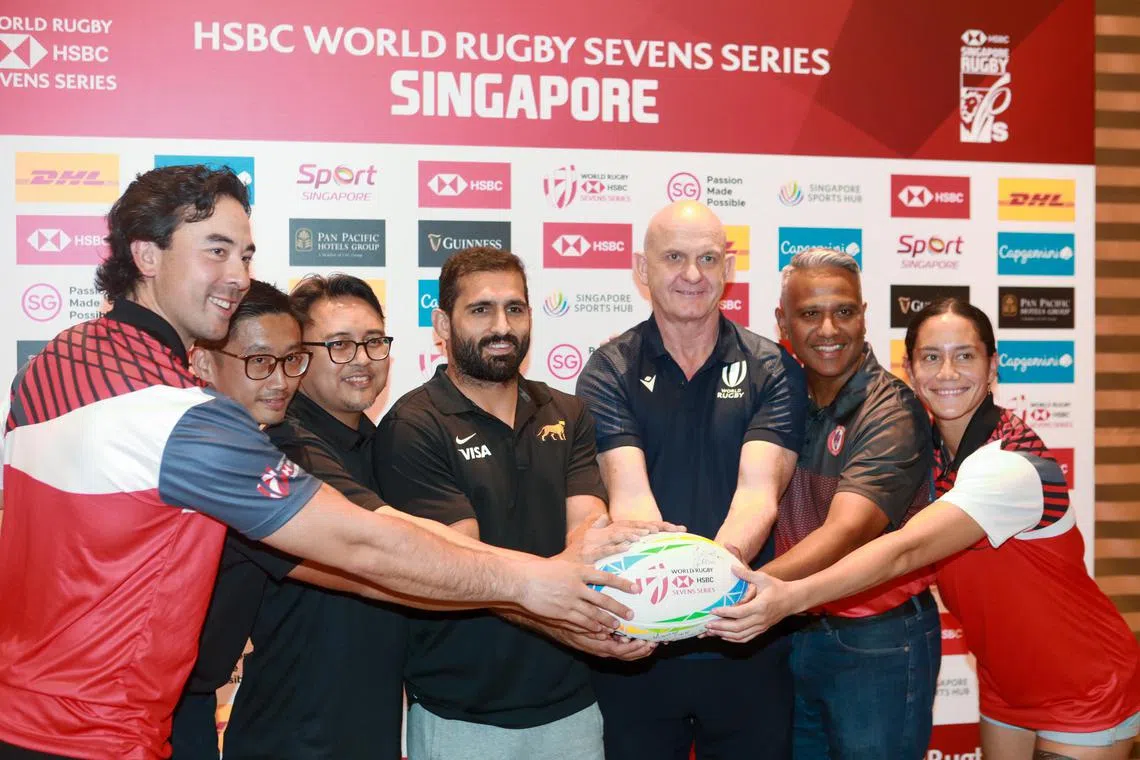Discussions ongoing regarding future of HSBC Singapore Rugby Sevens
Sign up now: Get the biggest sports news in your inbox

HSBC World Rugby Sevens Series director Douglas Langley (third from right) and Singapore Rugby Union deputy president George Danapal (second from right) were among those at the Singapore event launch on April 4.
ST PHOTO: RYAN CHIONG
SINGAPORE – It has been a regular fixture on the local sports calendar since 2016, but a question mark is hanging over the future of the HSBC Singapore Rugby Sevens.
The current deal for Singapore to host one of the series’ 10 legs ends with the 2023 edition at the National Stadium this weekend.
At the event launch at the Pan Pacific Singapore hotel on Tuesday, HSBC World Rugby Sevens Series director Douglas Langley said that an agreement for an extension has not yet been reached, but there will be conversations with Sport Singapore and the Sports Hub this weekend.
He told The Straits Times: “We’re going to make an announcement at the start of June (on the locations of future editions).
“We can’t commit to anything now or confirm anything because there’s still some (discussions) going on with a number of potential locations and venues.”
The Republic first hosted a leg of the World Rugby Sevens Series in 2002. The event was cancelled in 2003 due to the SARS outbreak, but Singapore resumed as host from 2004 to 2006.
After a 10-year hiatus, Singapore returned with a four-year agreement in 2016 with World Rugby to stage a leg of the series. A four-year extension was then inked in 2019.
Last November, World Rugby announced major changes to the Sevens Series. The number of men’s teams will be cut from 16 to 12. Citing concerns for player welfare, World Rugby also reduced the number of legs from 10 to seven for the new calendar, which comes into effect in December.
Calling it a “difficult decision”, Langley said: “We are waiting for the right decisions to come from the relevant evaluation and what those events (hosts) can give to the Sevens Series.
“We are going from 10 to seven as mentioned earlier, so someone will obviously lose out.”
The Singapore leg is the ninth of 11 stops in the HSBC World Rugby Sevens Series 2022/2023, which started in Hong Kong last November.
The 2016 to 2018 editions of the Singapore Sevens drew 140,000 fans in all, with the 2019 event attracting 57,000 to the National Stadium over two days.
In 2022, the number dropped to 22,000 over two days as daily attendance was capped at 12,000 as part of Covid-19 regulations, with spectators having to submit a self-administered negative antigen rapid test result to gain entry.
On whether he is satisfied with the attendance figures in Singapore, Langley said: “It can always be better and, if the event is still part of the series, as World Rugby, we’ve got to take a lot more responsibility in helping to market the event and helping to bring more spectators to the event.
“So if it is still here in the future, we’re going to try and keep the growth going in terms of spectator interest.”
Singapore Rugby Union secretary general Jonathan Leow said it was vital for the Singapore Sevens to continue as it helps brings rugby into “the major conscience”.
“From a community standpoint, you get kids and teens watching these players on the television one week and the next week they are watching them live,” he said.
“The knowledge transfer that happens as part of Sevens is also key where officials, medical staff, team liaisons and tournament administrators learn from a world-class event.”
In the interim, all eyes will be on the action in Pool A on Saturday. Dubbed the Pool of Death, Hong Kong Sevens winners New Zealand, 2019 champions South Africa and heavyweights Australia will battle with Hong Kong.
Defending champions Fiji make up Pool B with 2017 winners Canada, Spain and Samoa, while Pool C has France, Uruguay, USA and 2016 champions Kenya going toe to toe. Pool D consists of Britain, Argentina, Ireland and Japan.
This season’s series also doubles up as a 2024 Olympic qualifier, with the top four countries earning their tickets to Paris.
The lowest-placed core team will drop to the second-tier Challenger Series.



